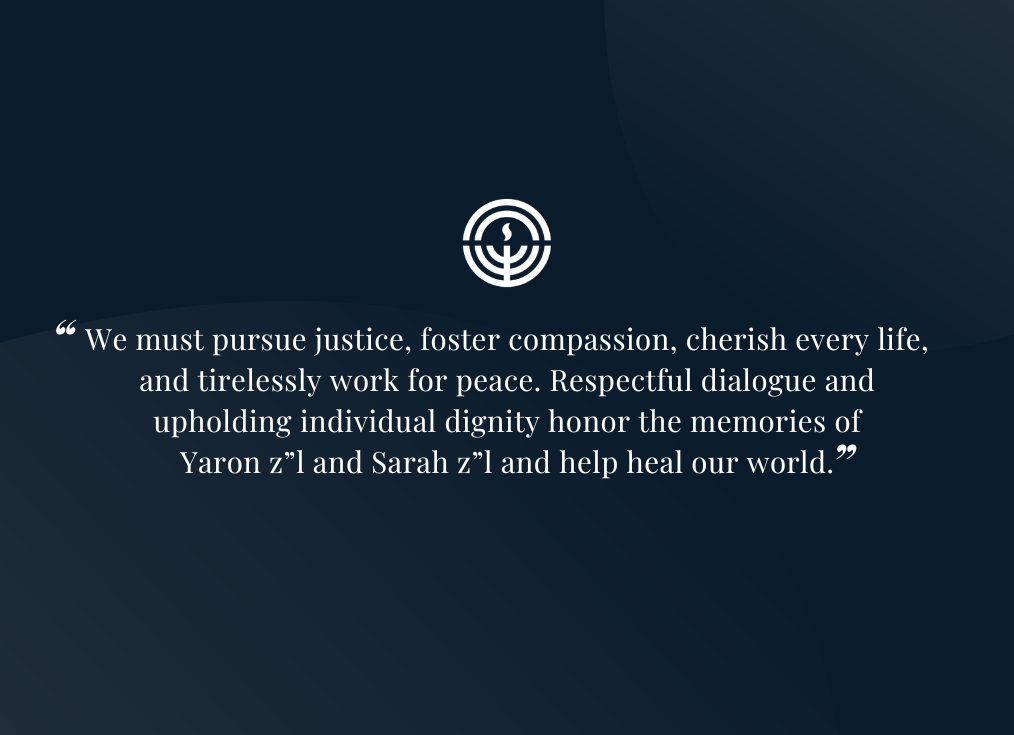We Remember Yaron Lischinsky z”l and Sarah Milgrim z”l

With heavy hearts, we remember Yaron Lischinsky z”l and Sarah Milgrim z”l, tragically murdered Wednesday night. Their murders outside Washington D.C.’s Capital Jewish Museum—a center of Jewish life, culture, and identity—overwhelmingly remind us of our vulnerability as Jews. This hateful act connects to our double parsha of Behar[1]-Bechukotai[2], envisioning an ideal society of divine law, harmony, and justice.
…
Central to Behar is “al tonu” – “you shall not wrong one another”[3]. Often understood financially, Sefer Ha-Chinuch[4] extends it to verbal harm, recognizing words’ deep, irreparable wounds. This highlights social equity, envisioning a community of divine guidance and mutual respect. These tragic deaths show how “al tonu“’s verbal harm can escalate to extreme violence, destroying our sense of security. Then, Bechukotai contrasts blessings with curses, promising peace and divine protection: “I will grant peace in the land, and you shall lie down untroubled… no sword shall cross your land”[5]. Today’s world often shatters this serene vision. This promise feels distant amid terrorism and hatred devastating the Lischinsky and Milgrim families and the Jewish people.
How do we reconcile this? The deaths of Yaron z”l and Sarah z”l desecrate the Torah’s envisioned peace and sanctity. Occurring at a site of Jewish heritage, fueled by hate, directly violates “al tonu“. Bechukotai’s harsh curses emphasize consequences when society’s moral framework – including guarding speech and actions – is breached, leading to fear, instability, and loss.Bechukotai, however, concludes with hope and Gd’s unwavering covenant: “Yet, even then, when they are in the land of their enemies, I will not reject them or spurn them so as to destroy them, annulling My covenant with them: for I am Adonai their Gd”[6].
Facing such heartbreaking loss, our tradition calls on us to strengthen our resolve, not despair. Remembering Yaron z”l and Sarah z”l compels us to build a world reflecting Torah’s ideals. This means recommitting to “al tonu“: refraining from verbal and financial harm and combating hate speech. We must pursue justice, foster compassion, cherish every life, and tirelessly work for peace. Respectful dialogue and upholding individual dignity honor the memories of Yaron z”l and Sarah z”l and help heal our world. May their memories be a blessing, inspiring a future free from sorrow, built on mutual respect and understanding.
Shabbat Shalom
Rabbi Marina Yergin
Associate Rabbi, Temple Beth-El
_________________
[1] Leviticus 25:1-26:2
[2] Leviticus 26:3-27:34
[3] Leviticus 25:14, 17
[4] The Sefer HaChinukh (“Book of Education”) is an anonymous work written in thirteenth-century Spain that clearly details the 613 commandments and explains the reasons behind them. In his introduction, the author explains that he wrote the book to “awaken the hearts” of his teenage son and his peers, hoping to foster in them a sense of connection to the commandments. For each commandment, the author cites a biblical source, addresses the philosophical underpinnings of the commandment, presents a brief overview of the details of its observance, and summarizes the commandment’s applicability. The work remains popular today, especially in educational settings.
[5] Leviticus 26:6
[6] Leviticus 26:44
